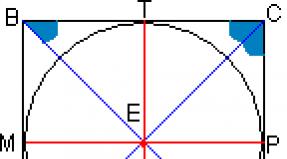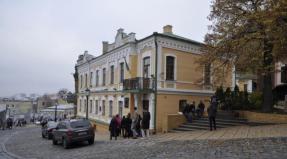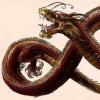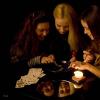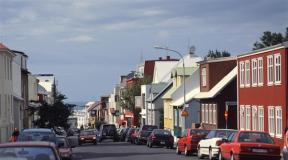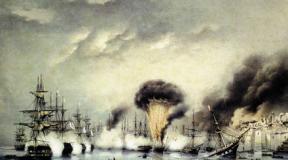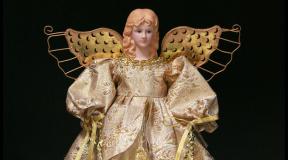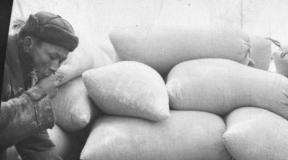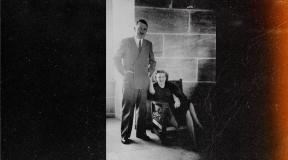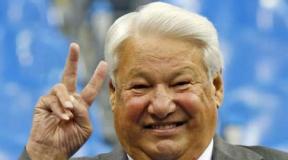White Guard short retelling. White Guard (novel). The main characters and their characteristics
The novel takes place in the winter of 1918/19 in a certain City, in which Kiev is clearly guessed. The city is occupied by German occupation troops, the hetman of "All Ukraine" is in power. However, from day to day the army of Petliura can enter the City - battles are already going on twelve kilometers from the City. The city lives a strange, unnatural life: it is full of visitors from Moscow and St. Petersburg - bankers, businessmen, journalists, lawyers, poets - who rushed there since the election of the hetman, since the spring of 1918.
In the dining room of the Turbins' house, at dinner, Aleksey Turbin, a doctor, his younger brother Nikolka, a non-commissioned officer, their sister Elena and family friends - Lieutenant Myshlaevsky, Second Lieutenant Stepanov, nicknamed Karas, and Lieutenant Shervinsky, adjutant at the headquarters of Prince Belorukov, commander of all the military forces of Ukraine , - excitedly discuss the fate of their beloved City. The elder Turbin believes that the hetman is to blame for his Ukrainization: until the very last moment, he did not allow the formation of the Russian army, and if this happened on time, a select army of cadets, students, high school students and officers, of whom there are thousands, would be formed. and not only would the City have defended, but Petliura would not have been in Little Russia, moreover, they would have gone to Moscow and Russia would have been saved.
Elena's husband, captain of the general staff Sergei Ivanovich Talberg, announces to his wife that the Germans are leaving the City and he, Talberg, is being taken on the staff train leaving tonight. Thalberg is sure that within three months he will return to the City with Denikin's army, which is now being formed on the Don. In the meantime, he cannot take Elena into the unknown, and she will have to stay in the City.
To defend against the advancing troops of Petliura, the formation of Russian military units began in the City. Karas, Myshlaevsky and Aleksey Turbin appear to the commander of the emerging mortar battalion, Colonel Malyshev and enter the service: Karas and Myshlaevsky as officers, Turbin as a divisional doctor. However, the next night - from 13 to 14 December - the hetman and General Belorukov flee the City in a German train, and Colonel Malyshev dissolves the newly formed division: he has no one to defend, there is no legitimate power in the City.
Colonel Nye Tours finishes the formation of the second division of the first squad by December 10. Considering the conduct of war without winter equipment for soldiers is impossible, Colonel Nye Tours, threatening the head of the supply department with a colt, receives boots and hats for his one hundred and fifty cadets. On the morning of December 14, Petliura attacks the City; Nai Tours receives an order to guard the Polytechnic Highway and, if an enemy appears, to take battle. Nai-Tours, having entered the battle with the advanced detachments of the enemy, sends three cadets to find out where the hetman's units are. The sent ones return with the message that there are no units anywhere, there is machine-gun fire in the rear, and the enemy cavalry is entering the City. Nye realizes that they are trapped.
An hour earlier, Nikolai Turbin, corporal of the third division of the first infantry squad, receives the order to lead the team along the route. Arriving at the appointed place, Nikolka with horror sees the running junkers and hears the command of Colonel Nai-Tours, ordering all the junkers - both his own and from Nikolka's team - to rip off shoulder straps, cockades, throw weapons, tear documents, run and hide. The colonel himself is covering the withdrawal of the cadets. In front of Nikolka's eyes, the mortally wounded colonel dies. Shaken, Nikolka, leaving Nai-Tours, makes his way to the house in courtyards and alleys.
Meanwhile, Alexei, who was not informed about the dissolution of the division, having appeared, as he was ordered, by two o'clock, finds an empty building with abandoned guns. Having found Colonel Malyshev, he gets an explanation of what is happening: The city is taken by the troops of Petliura. Alexei, having ripped off his shoulder straps, goes home, but runs into Petliura's soldiers, who, recognizing him as an officer (in a hurry, he forgot to rip off the cockade from his hat), pursue him. Alexei, who was wounded in the arm, is sheltered in his house by an unfamiliar woman named Julia Reisse. The next day, after dressing Alexei in civilian dress, Yulia takes him home in a cab. At the same time with Alexei, Talberg's cousin Larion comes from Zhitomir to Turbin, who has gone through a personal drama: his wife left him. Larion really likes the Turbins' house, and all Turbins find him very attractive.
Vasily Ivanovich Lisovich, nicknamed Vasilisa, the owner of the house in which the Turbins live, occupies the first floor in the same house, while the Turbins live in the second. On the eve of the day when Petliura entered the City, Vasilisa builds a cache in which he hides money and jewelry. However, through a crack in a loosely curtained window, an unknown person is watching Vasilisa's actions. The next day, three armed men come to Vasilisa with a search warrant. First of all, they open the cache, and then take away Vasilisa's watch, suit and boots. After the “guests” leave, Vasilisa and his wife guess that they were bandits. Vasilisa runs to the Turbins, and Karas is sent to them to protect against a possible new attack. Usually avaricious Vanda Mikhailovna, Vasilisa's wife, is not stingy here: there is cognac, veal, and pickled mushrooms on the table. Happy Crucian doze, listening to Vasilisa's plaintive speeches.
Three days later, Nikolka, having learned the address of the Nai-Tours family, goes to the colonel's relatives. He tells Nye's mother and sister the details of his death. Together with the colonel's sister Irina, Nikolka finds the body of Nai-Tours in the morgue, and on the same night in the chapel at the anatomical theater of Nai-Tours they perform the funeral service.
A few days later, Alexei's wound becomes inflamed, and besides, he has typhus: high fever, delirium. According to the conclusion of the council, the patient is hopeless; The agony begins on December 22nd. Elena locks herself in her bedroom and fervently prays to the Most Holy Theotokos, begging to save her brother from death. "Let Sergei not return," she whispers, "but don't punish this with death." To the amazement of the doctor on duty, Alexei regains consciousness - the crisis is over.
A month and a half later, finally recovered, Alexei goes to Yulia Reisa, who saved him from death, and gives her a bracelet of his late mother. Alexei asks Julia for permission to visit her. Leaving Julia, he meets Nikolka, returning from Irina Nai-Tours.
Elena receives a letter from a friend from Warsaw, in which she informs her about the upcoming marriage of Thalberg to their mutual friend. Elena, sobbing, recalls her prayer.
On the night of February 2–3, the Petliura troops began to leave the City. The roar of the guns of the Bolsheviks, which approached the City, is heard.
"The White Guard" is Bulgakov's very first novel!
The action of the work takes place in 1918-1919 in the unknown City N, which resembles Kiev. It is occupied by the German invaders, power is concentrated in the hands of the hetman. Everyone is waiting for Petliura's fighters to enter the City. Life in the village is going on in a strange and unnatural way.
In the Turbins' house, the owners and guests of the family are talking about the fate of their beloved City. Aleksey Turbin is sure that the blame lies with the hetman, who did not form the Russian army in time. Then it would have been possible to defend the City, to save Russia and there would be no Petliura troops.
Elena's spouse Sergei Talberg tells her that he is leaving with the Germans by train. He hopes that in a couple of months he will arrive with Denikin's army. The captain does not take his wife with him.
To defend against the Petliura army, Russian divisions are formed. Karas, Myshlaevsky and senior Turbin go to serve Malyshev. But the next night, the hetman, along with General Belorukov, leave on a German train. The colonel dissolves his army, since the city government is no longer there.
Colonel Nye Tours forms the second division of the first squad by December. Under the threat of the Colt, he forces the chief of supply to issue winter clothes for his fighters. The next morning, Petliura's army advances on the City, the colonel's soldiers desperately go into battle. Nai-Tours sends scouts to find out where the hetman's units are. It turns out that they are nowhere to be found. It becomes obvious to the colonel that they are trapped.
Nikolai Turbin, by order of the commander, arrives at the indicated place. There, a terrible picture appears in front of him: Nai Tours shouts to all soldiers to tear all documents, rip off shoulder straps and cockades, throw weapons and hide in shelters. Before Turbin's eyes, the colonel dies from a gunshot wound. Kolya is trying to get to the house.
Senior Turbin, who did not know about the disbandment of the army, comes to the headquarters. There he sees the abandoned weapon and Malyshev, who explains that the city was captured by the Petliura army. Alexei rips off his shoulder straps and goes home, but on the way Petliura's soldiers shoot at him. The wounded Turbin is sheltered by an unfamiliar lady Julia Reiss, and the next day she helps him get home. Larion, Sergey's brother, arrives at the Turbins and stays with them to stay.
Lisovich Vasily Ivanovich, the owner of the house where Turbins live, settles on the first floor. The Turbins' family is on the second. Before the Petliurites enter the City, Vasily hides jewelry and money in a cache. Someone is watching him closely and the next day the armed guys come to search him. The contents of the cache, clothes and watches of the owner are taken away. The Lisovich spouses suspect that they were criminals and are asking for help from the Turbins. Karas is sent to help them.
Nikolai informs the relatives of Nai-Tours about his death. Together with the colonel's sister Ira, he finds the body of the deceased. His funeral service is performed at night.
After a couple of days from the injury, Alexei fell seriously ill, the doctors talk about imminent death. His sister closes in her room and prays to the Mother of God that Lesha will survive. At the same time, she says that it is better not to return the husband, and the brother will remain alive. Suddenly Turbin wakes up in front of the startled doctor.
A little over a month later, the finally recovered Alyosha comes to Julia Reiss and hands her the bracelet of his late mother as a token of gratitude for her salvation. Turbin asks if he can come to visit. On the way, he meets his brother, walking from the sister of Nai-Tours.
Elena receives a letter from a close friend, where it is reported that her husband is marrying a completely different lady. The woman, crying, recalls that night prayer ..
In February, the Petliurites leave. The Bolsheviks are hastily approaching the City.
A short retelling of "The White Guard" in an abbreviated form was prepared by Oleg Nikov for the reader's diary.
Part one
The winter of 1918 was snowy and frosty. Young Turbines did not notice how December came. Their mother died a year after their daughter Elena got married to the captain Sergei Ivanovich Talberg. In the same week, the eldest son Aleksey Vasilyevich Turbin returned to Ukraine.
For many years before his death, little Yelenka, the elder Aleksey and very tiny Nikolka grew up in house number 13 on Alekseevsky Spusk. As time went. The father professor has died. Children have grown up. Only the clock, as before, measured the running of time. Dying, the mother bequeathed her children to live in harmony.
And now the eighteenth year. Alexey, who became a doctor, turned twenty-eight, Elena - twenty-four, her husband - thirty-one, and Nikolka - seventeen and a half. The Turbins' house was two-story. Upstairs was the Turbins' apartment, and the first floor was occupied by "an engineer and a coward, bourgeois and unsympathetic", Vasily Ivanovich Lisovich, nicknamed Vasilisa. Alexey and Nikolka went to the shed for firewood and found that someone was stealing fuel. Nikolka offered to set up an ambush, but Alexey did not agree, and they dragged the wood home. In the warm room, the brothers were worn out. Alexey asked the young man to play "Shooting" and he began to sing along with him. Elena entered the room. She was worried about her husband, who promised to come back at three o'clock, and now it is already late evening. It was restless in the street, from time to time there was shooting.
The young people went into the dining room. Nikolka brought a samovar. He began to argue why they were shooting so close, to which the elder brother suddenly declared that the Germans were scoundrels. Elena was afraid that the Germans would leave them to their fate. Petliura's troops were stationed under the city.
There was a thin ringing. Elena is a little disappointed, because it was not her husband who came, but Lieutenant Viktor Viktorovich Myshlaevsky. He asked to stay for the night, as he was in such a state that he was afraid not to go home. He just got off the front line. In narrow, dandy boots, Myshlaevsky completely froze his legs and was afraid that they would have to be cut off. Alexei calmed him down. Slowly the lieutenant began to come to life. He talked about what was happening on the fortifications, how the city was being defended from Petliura. The picture is bleak. Complete confusion, it is unclear who is fighting for whom. In one of the villages the officers met their grandfather, who mistook them for the Petliurites. He warmly welcomed the intruders. Having understood the situation, the grandfather immediately changed his tactics and even found sledges and horses for the wounded. There were no headquarters at the post, the batteries were not deployed due to the lack of shells, and Colonel Shchetkin at that time locked himself in his carriage with his entourage and drank brandy. The brothers took the guest to wash.
Elena's husband returned and called her to their room for a few words. Thalberg told his wife that he urgently needed to leave, since the troops were defeated, and a huge peasant mass was fighting on the side of Petliura. Elena's husband was experienced in military affairs and politics. He had a subtle sense of the situation, and Elena understood that she might never see him again. Thalberg escaped, leaving her in the care of the brothers.
Meanwhile, on the ground floor, Vasilisa checked the locks, the bolt, and the chain and returned to his study. He curtained the window and opened the door to a cache in the wall. There he neatly laid the package in newsprint and again sealed the hiding place door in such a way that not even signs of its existence were noticeable. While Vasilisa was performing this operation, someone was watching him through the window from the street through a narrow gap in the sheet. The neighbor of the Turbins had three caches, each of which contained money, gold and securities. Counting the bills, Vasilisa identified several fake ones among them. He carefully put them aside, hoping to pay them off to the cab and at the bazaar. Voices and laughter rang out from above, and the guitar began to play.
The Turbins did indeed have guests: Lieutenant Leonid Yuryevich Shervinsky and Second Lieutenant Fyodor Nikolaevich Stepanov, nicknamed Karas. Elena, hastily powdering her face, received the guests. During dinner, the conversation was about military operations on the outskirts of the city. Then Shervinsky started talking about the fact that after the war the Germans could help Moscow in the fight against the Bolsheviks. The hetman could solemnly put Ukraine at the feet of the emperor. Nikolka said that the emperor was killed. Shervinsky objected: it has long been known that the emperor and his family were saved with the help of the heir's faithful tutor. The young man wanted to believe this news, and he offered to raise glasses to the emperor. Young people agreed that only a monarchy can save Russia. Together they sang the forbidden royal hymn. On the first floor Vasilisa woke up and waited in fear for the singing to end. Finally they calmed down at the top.
Elena was left alone in her room. She began to reason with herself about herself and about her husband. Elena realized that she did not respect her husband at all. In another room Alexey thought about Talberg, having come to the conclusion that he was a scoundrel.
Throughout the winter of 1918, the city lived a strange life. The apartments were overcrowded. Gray-haired bankers with their families, talented businessmen, homeowners, industrialists, merchants, lawyers, public figures and many others fled here from Russia.
Numerous food shops were opened in the city, trading until late at night. The best pens of Russia began to be printed in local newspapers, vilifying the Bolsheviks. The Bolsheviks were hated with a cowardly, hissing hatred.
There were many officers who were forced to remain in the City, as it was most difficult for them to obtain forged documents and cross the border. However, there were also indigenous people, such as Aleksey Turbin, who returned to the city to arrange a new, non-military life. Locked in the city, all these people did not know what was happening outside of it, in real Ukraine.
All hope was in the Germans. There were only two forces until the third appeared.
She appeared gradually. Her first sign was the appearance one morning on the streets of the city of women running in only shirts and screaming in terrible voices. On Bald Mountain there was an explosion of ammunition and gunpowder warehouses. The second sign was the assassination of the commander-in-chief of the German army in Ukraine, Field Marshal Eichhorn. Products began to rise in price.
When Vasilisa reproached the milkmaid for raising prices and threatened the Germans, she only promised that the Ukrainians themselves would teach them reason. In the fall, a criminal with the simple name Petliura Semyon Vasilyevich was released from prison. For four hundred thousand Germans, there were "four times forty times four hundred thousand men with hearts burning with unquenchable malice." German officers could not resist and surrendered the city. The Germans began to leave Ukraine.
The next morning Turbin, Myshlaevsky and Karas stood up almost simultaneously and with clear heads. Myshlaevsky made his morning toilet, befriended Anyuta, who had returned, and begged Elena for one glass. Before the young people left, the hostess baptized them.
Karas, along with Alexei Turbin, who wanted to enroll in the army, went to the colonel. They were joined by Lieutenant Myshlaevsky. The colonel was delighted at the desire of two men to join the division. Myshlaevsky's translation went without difficulty. Turbina the colonel first asked about his political position. When he found out that the doctor was a monarchist, at first he did not want to take him to the division. However, on reflection, he ordered the doctor to be given uniforms. Alexei had to appear in an hour at the parade ground of the Alexander Gymnasium.
When Turbin, having been at home, went to his destination, he met a crowd along the way, in which there were many people in black coats. It turned out to be a funeral procession. They buried the officers who were cut by the peasants and Petliurists in Popelyukha. The crowd surrounded Alexey. Shouts rushed. Someone from behind shouted: "So they need it", driving Turbin into a rage. However, the young man could not find the one who was shouting.
When Turbin crossed the parade ground, the four mortars stood in lines. Captain Studzinsky appeared, who ordered the formation to follow to the basement passage of the gymnasium. Alexey received a team of paramedics, consisting of two students, and gave them orders. Sharing his impressions among the officers, Myshlaevsky complained that fifteen people in his platoon did not know what a rifle was at all, but the mood was cheerful.
The battalion commander, Colonel Malyshev, arrived, who greatly surprised Studzinsky with his order to disband the division until tomorrow morning, with the exception of a few officers. Alexei was allowed to go home, while Myshlaevsky remained in charge of lighting the premises.
Monsieur Colonel spent a busy night, making several flights between the grammar school and Madame Anjou's shop, where the headquarters was located. Finally, at one in the morning, he finally settled in the headquarters, but did not go to bed, he talked with someone on the phone all the time. At two o'clock in the morning a motorcycle drove up to the store, from which a military man got out. He handed the colonel a bulky bundle and drove off. Malyshev ordered the officer on duty to wake him up at half past six.
Three people were making their way up the hill in the middle of the night past the officers' guards. Hiding behind the parapet, they watched Aleksandrovskaya Street, along which from time to time German cars flew by and the military passed.
A strange bustle reigned in the palace. In one of the bedrooms, a thin, gray-haired man was dressed in the uniform of a German major, and he became no better or worse than hundreds of other German officers.
Then the military doctor of the German army entered and bandaged the newly made major in such a way that only his right eye and thin mouth were visible.
A German came into the hall and said that Major von Schratt had accidentally wounded himself in the neck. A car approached, the patient was laid on a stretcher and taken away. A soldier in the uniform of an artillery colonel from the palace called the headquarters of the mortar division.
In the morning, Malyshev dismissed the division, saying that overnight the situation in the army and in Ukraine in general had changed. Studzinsky took the message as treason and made an attempt to arrest the colonel. Malyshev told the battalion that at night the hetman fled, leaving them to fend for themselves. In addition, the commanding general from the cavalry Belorukov left the army. He also said that Petliura had more than a hundred thousand army on the outskirts of the city, so he did not want the people of his division to be killed like dogs. The trumpeter retreated. Karas and Myshlaevsky went to their apartment
4.5 (90.77%) 13 vote [s]
Searched here:
- white guard chapter summary
- white guard summary by chapters and parts
- white guard summary
The novel takes place in the winter of 1918/19 in a certain City, in which Kiev is clearly guessed. The city is occupied by German occupation troops, the hetman of "All Ukraine" is in power. However, from day to day the army of Petliura can enter the City - battles are already going on twelve kilometers from the City. The city lives a strange, unnatural life: it is full of visitors from Moscow and St. Petersburg - bankers, businessmen, journalists, lawyers, poets - who rushed there since the election of the hetman, since the spring of 1918.
In the dining room of the Turbins' house, at dinner, Aleksey Turbin, a doctor, his younger brother Nikolka, a non-commissioned officer, their sister Elena and family friends - Lieutenant Myshlaevsky, Second Lieutenant Stepanov, nicknamed Karas, and Lieutenant Shervinsky, adjutant at the headquarters of Prince Belorukov, commander of all the military forces of Ukraine , - excitedly discuss the fate of their beloved City. The elder Turbin believes that the hetman is to blame for his Ukrainization: until the very last moment, he did not allow the formation of the Russian army, and if this happened on time, a select army of cadets, students, high school students and officers, of whom there are thousands, would be formed. and not only would the City have defended, but Petliura would not have been in Little Russia, moreover, they would have gone to Moscow and Russia would have been saved.
Elena's husband, captain of the general staff Sergei Ivanovich Talberg, announces to his wife that the Germans are leaving the City and he, Talberg, is being taken on the staff train leaving tonight. Thalberg is sure that within three months he will return to the City with Denikin's army, which is now being formed on the Don. In the meantime, he cannot take Elena into the unknown, and she will have to stay in the City.
To defend against the advancing troops of Petliura, the formation of Russian military units began in the City. Karas, Myshlaevsky and Aleksey Turbin appear to the commander of the emerging mortar battalion, Colonel Malyshev and enter the service: Karas and Myshlaevsky as officers, Turbin as a divisional doctor. However, the next night - from 13 to 14 December - the hetman and General Belorukov flee the City in a German train, and Colonel Malyshev dissolves the newly formed division: he has no one to defend, there is no legitimate power in the City.
Colonel Nye Tours finishes the formation of the second division of the first squad by December 10. Considering the conduct of war without winter equipment for soldiers is impossible, Colonel Nye Tours, threatening the head of the supply department with a colt, receives boots and hats for his one hundred and fifty cadets. On the morning of December 14, Petliura attacks the City; Nai Tours receives an order to guard the Polytechnic Highway and, if an enemy appears, to take battle. Nai-Tours, having entered the battle with the advanced detachments of the enemy, sends three cadets to find out where the hetman's units are. The sent ones return with the message that there are no units anywhere, there is machine-gun fire in the rear, and the enemy cavalry is entering the City. Nye realizes that they are trapped.
An hour earlier, Nikolai Turbin, corporal of the third division of the first infantry squad, receives the order to lead the team along the route. Arriving at the appointed place, Nikolka with horror sees the running junkers and hears the command of Colonel Nai-Tours, ordering all the junkers - both his own and from Nikolka's team - to rip off shoulder straps, cockades, throw weapons, tear documents, run and hide. The colonel himself is covering the withdrawal of the cadets. In front of Nikolka's eyes, the mortally wounded colonel dies. Shaken, Nikolka, leaving Nai-Tours, makes his way to the house in courtyards and alleys.
Meanwhile, Alexei, who was not informed about the dissolution of the division, having appeared, as he was ordered, by two o'clock, finds an empty building with abandoned guns. Having found Colonel Malyshev, he gets an explanation of what is happening: The city is taken by the troops of Petliura. Alexei, having ripped off his shoulder straps, goes home, but runs into Petliura's soldiers, who, recognizing him as an officer (in a hurry, he forgot to rip off the cockade from his hat), pursue him. Alexei, who was wounded in the arm, is sheltered in his house by an unfamiliar woman named Julia Reisse. The next day, after dressing Alexei in civilian dress, Yulia takes him home in a cab. At the same time with Alexei, Talberg's cousin Larion comes from Zhitomir to Turbin, who has gone through a personal drama: his wife left him. Larion really likes the Turbins' house, and all Turbins find him very attractive.
Vasily Ivanovich Lisovich, nicknamed Vasilisa, the owner of the house in which the Turbins live, occupies the first floor in the same house, while the Turbins live in the second. On the eve of the day when Petliura entered the City, Vasilisa builds a cache in which he hides money and jewelry. However, through a crack in a loosely curtained window, an unknown person is watching Vasilisa's actions. The next day, three armed men come to Vasilisa with a search warrant. First of all, they open the cache, and then take away Vasilisa's watch, suit and boots. After the “guests” leave, Vasilisa and his wife guess that they were bandits. Vasilisa runs to the Turbins, and Karas is sent to them to protect against a possible new attack. Usually avaricious Vanda Mikhailovna, Vasilisa's wife, is not stingy here: there is cognac, veal, and pickled mushrooms on the table. Happy Crucian doze, listening to Vasilisa's plaintive speeches.
Three days later, Nikolka, having learned the address of the Nai-Tours family, goes to the colonel's relatives. He tells Nye's mother and sister the details of his death. Together with the colonel's sister Irina, Nikolka finds the body of Nai-Tours in the morgue, and on the same night in the chapel at the anatomical theater of Nai-Tours they perform the funeral service.
A few days later, Alexei's wound becomes inflamed, and besides, he has typhus: high fever, delirium. According to the conclusion of the council, the patient is hopeless; The agony begins on December 22nd. Elena locks herself in her bedroom and fervently prays to the Most Holy Theotokos, begging to save her brother from death. "Let Sergei not return," she whispers, "but don't punish this with death." To the amazement of the doctor on duty, Alexei regains consciousness - the crisis is over.
A month and a half later, finally recovered, Alexei goes to Yulia Reisa, who saved him from death, and gives her a bracelet of his late mother. Alexei asks Julia for permission to visit her. Leaving Julia, he meets Nikolka, returning from Irina Nai-Tours.
Elena receives a letter from a friend from Warsaw, in which she informs her about the upcoming marriage of Thalberg to their mutual friend. Elena, sobbing, recalls her prayer.
On the night of February 2–3, the Petliura troops began to leave the City. The roar of the guns of the Bolsheviks, which approached the City, is heard.
Bulgakov's "White Guard", a summary of which is hardly capable of reflecting the full depth of the work, describes the events of late 1918-early 1919. This book is largely autobiographical: the author himself, his friends and family are present on its pages. The action of the novel undoubtedly takes place in Kiev, which is simply called the city. In the "pseudonyms" of the streets, the originals are easily guessed, and the names of the districts (Pechersk, Podol) Bulgakov left altogether unchanged.
Situation in the city
The townspeople have already experienced the short "arrival" of the Ukrainian People's Republic. Betrayed by the allies, the White Guard disappeared into space. The novel, a summary of which is presented below, fully reflects the nightmare of post-revolutionary Kiev life. At the moment when events begin, the city is experiencing its final days under the rule of a German-backed hetman.
The Turbins' family lives on Alekseevsky Spusk, at house number 13: 27-year-old Aleksey, 24-year-old Elena and Nikolka, who is only 17 years old. The story begins with the fact that on a frosty December evening Lieutenant Myshlaevsky, frozen to death, bursts into the apartment. It is clear from his story that there is confusion and betrayal in the army. Late in the evening, Elena's husband, Sergey Talberg, returns from a business trip - an insignificant person, ready to adapt to any bosses. He informs his wife that he is forced to flee immediately: the Germans are leaving the capital.
Illusions and unrealizable hopes
In the city, squads are actively being formed to protect against the advancing Petliura. These scattered units, in which 80 of 120 cadets do not know how to shoot, is the very same White Guard, desperately clinging to its former life and suffering imminent disaster. The summary of events can hardly adequately describe the subsequent disaster.
Someone in the city is still experiencing rainbow illusions. Turbines and family friends also did not lose hope of a good outcome. Deep down, they cherish the hope that somewhere on the Don is Denikin and his invincible White Guard. The content of the conversations in the Turbins' apartment makes a depressing impression: tales of the emperor's miraculous salvation, toasts to his health, talks about the impending "attack on Moscow."

Lightning war
The hetman disgracefully flees, the generals in command of the troops follow his example. There is confusion in the headquarters. The officers, who have not lost their conscience, warn the personnel and give young guys, almost children, the opportunity to escape. Others throw unprepared, poorly armed cadets to certain death. Among the latter is Nikolka Turbin, a 17-year-old squad leader of twenty-eight. Having received the order to go "for reinforcements", the guys did not find anyone in the position, and after a few minutes they saw the remnants of the fleeing unit of Colonel Nai Tours, who died in front of the younger Turbin, trying to cover the panicky "retreat" of the city defenders with machine-gun fire.
The capital was taken by the Petliurists without a fight - the pitiful, scattered White Guard could not give it. It will not take long to read a summary of her further fate - it fits in the answer of a little boy, met by the younger Turbin at Alekseevsky: “There are eight hundred of them in the whole city, and they were playing the fool. Petliura came, and he has a million troops. "
The theme of God in the novel "The White Guard"
Nikolka himself manages to get to the house in the evening, where he finds a pale, agitated Elena: Alexei has not returned. Only the next day, the elder brother is brought in by a stranger who saved him - Julia Reiss. His condition is critical. When typhus is added to the fever caused by the wound, doctors decide that Turbin is not a tenant.

In the works of Bulgakov, the theme of religion is an everyday phenomenon. The White Guard was no exception. The summary of the prayer that Helen brings to the Mother of God looks like a deal: take your husband, but leave your brother. And a miracle happens: the hopeless patient is on the mend and is recovering by the time Petliura leaves the city. At the same time, Elena learns from the letter she received that her husband left her.
This is where the Turbins' misadventures end. A warm company of surviving friends gathers again on Alekseevsky Spusk: Myshlaevsky, Shervinsky, Karas.
... and the theme of the devil
Life takes its toll: on Malo-Provalnaya Street, Nikolka and Alexei Turbins collide. The youngest comes from Nai-Turs: he is attracted by the sister of the deceased colonel. The elder went to thank his savior and confesses that she is dear to him.

In the house of Reiss, Alexei sees a photograph of a man and, asking who it is, receives an answer: a cousin who left for Moscow. Julia is lying - Shpolyansky is her lover. The surname named by the savior evokes in the doctor an “unpleasant, sucking thought”: a patient “touched” on the basis of religion told Turbin about this “cousin” as a forerunner of the Antichrist: “He is young. But the abominations in him, as in the millennial devil ... ".
It is amazing that in the Soviet Union the White Guard was published in general - an analysis of the text, even the most superficial, gives a clear understanding that Bulgakov considered the Bolsheviks the worst of threats, "aggels", Satan's henchmen. From 1917 to 1921, Ukraine was a kingdom of chaos: Kiev found itself in the power of one or another "benefactor" who could not agree with each other or with anyone else - and as a result were unable to fight the dark force. which was approaching from the North.
Bulgakov and the revolution
When reading the novel "The White Guard", analysis, in principle, is useless: the author speaks out quite bluntly. Mikhail Afanasyevich treated revolutions badly: for example, in the story “The Future Prospects” he unequivocally assesses the situation: the country found itself “at the very bottom of the pit of shame and disaster, into which it was driven by the“ great social revolution ”.

The White Guard does not in the least conflict with such a worldview. The summary cannot convey the general mood, but it clearly stands out when reading the full version.
Hatred is the root of what is happening
The author understood the nature of the cataclysm in his own way: "four times forty times four hundred thousand men with hearts burning with unquenchable malice." And after all, these revolutionaries wanted one thing: an agrarian reform in which the land would go to the peasants - for eternal possession, with the right to be passed on to children and grandchildren. This is very romantic, but the sane Bulgakov understands that "the adored hetman could not carry out such a reform, and he won’t do anything like that." I must say that Mikhail Afanasyevich was absolutely right: as a result of the arrival of the Bolsheviks, the peasants were hardly in a better position.

Times of great upheaval
What people do on the basis of and in the name of hatred cannot be good. The senseless horror of what is happening Bulgakov demonstrates to the reader, using abrupt, but memorable images. The "White Guard" abounds in them: a man whose wife is giving birth runs to the midwife. He gives the "wrong" document to the horseman from Petliura, and he chops it off with a sword. The Haidamaks find a Jew behind a stack of firewood and beat him to death. Even the greedy Turbino landlord, robbed by bandits under the guise of a search, adds a touch to the picture of the chaos that the revolution ultimately brought to the "little man".

Anyone who wants to understand more deeply the essence of the events of the early twentieth century cannot find a textbook better than Bulgakov's White Guard. Reading a summary of this work is the lot of careless schoolchildren. This book certainly deserves a better lot. Written in magnificent, piercing prose, it once again reminds us of what an unsurpassed master of words Mikhail Bulgakov was. "White Guard", a summary of which in various versions is offered by the worldwide network, belongs to the category of literature with which it is better to get acquainted, as closely as possible.
